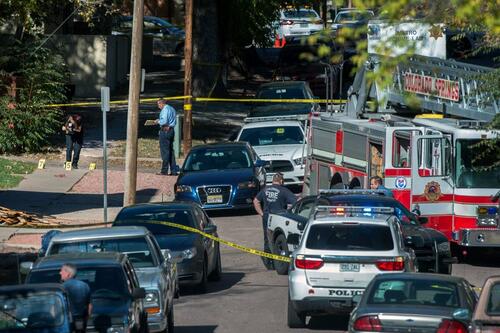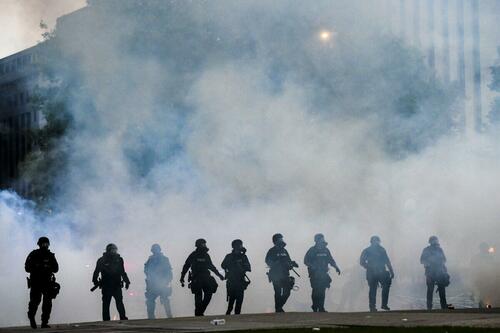
Authored by Katie Spence via The Epoch Times (emphasis ours),
Rep. Gabe Evans isn’t a career politician. Before being elected to his first term as a Colorado State representative on Nov. 8, 2022, Evans served 12 years in the U.S. Army and Colorado Army National Guard, and 10 years as an Arvada, Colorado, police officer, sergeant, and lieutenant.
As such, Evans has extensive experience in law enforcement and combating crime. When he was asked about a March report from the U.S. Department of Justice (DOJ) that found that among the 22 most populous states, Colorado was number one for violent crime and what’s led to the increase, Evans was quick to answer.
“In 2012, 2013, 2014, what we really started to see was this push to either reduce penalties or to completely decriminalize a whole bunch of different—and I’ll call them addictive substances because, to me, that’s the important part of this—but I’m talking drugs,” Evans told The Epoch Times.
“It’s the addiction power of drugs that I think kind of laid part of the foundation for where we’re at. There’s a lot of [legislation] we’ve [passed] to reduce penalties on meth, on cocaine, on heroin, on fentanyl. We just legalized, via a popular referendum, psilocybin this last election.
“And the unfortunate side effect of all that is there is still a massive international presence dedicated to the drug trade. You know, you’ve got huge cartels in Mexico that the Mexican government has trouble controlling.”

Evans said the push to reduce drug penalties encouraged cartels to “set up shop” in Colorado, as did the push to make it harder to enforce existing laws. “What happens is, inadvertently or not, [these policies] attract a huge criminal presence from the people who make a living distributing and trafficking this stuff,” Evans said.
That, Evans added, led to an increase in other crimes, like vehicle theft and robberies, to fuel drug habits.
Still, lax drug laws aren’t entirely responsible for Colorado’s escalating crime. The other factor, Evans explained, is what’s happening to officers.
“You don’t usually see a lot of attrition in law enforcement in the 5-to-15-year range,” Evan said. “When Senate Bill 20-217 kicked in, most of the attrition occurred in that 5-to-15-year range.
Among other provisions, SB 217 requires all local law enforcement to wear body-worn cameras—except in undercover, and certain situations—updating reporting requirements, and updated penalties for unlawful use of force. It also limits how officers can respond to a protest or demonstration, and allows for civil action suits against officers.
“I mean, look at me. I was 10 years into my career. I was the youngest lieutenant in recent history at Arvada. I was making a solid six figures, and I walked away from that career, in which I was on a trajectory to be a chief or a sheriff in a few more years if I wanted to be competitive.
“And I walked away from it. And there are, from my agency alone—my agency is less than 200 cops—from my agency alone, I can tell you dozens of similar stories of solid cops, solid detectives, solid sergeants with 5-to-15 years of experience that said, ‘I’m out. I cannot work in this toxic environment.’ That goes back to Senate Bill 217.”
Escalating Crime
The DOJ March report analyzed data from the National Crime Victimization Survey (NCVS) from 2017–2019 and found 45 “violent victimizations per 1,000 persons age 12 or older” in Colorado. Violent victimization includes sexual assault or rape, robbery, and aggravated and simple assault.
The NCVS is considered the nation’s primary source for data on criminal victimization because it includes crimes reported and not reported to the police. The March report is the first time the Bureau of Justice Statistics (BJS) has released the NCVS’s victimization data.
Moreover, while the report covers 2017–2019, the most recent data shows Colorado crimes have escalated. The Common Sense Institute reports that in 2022, crimes increased in seven major categories—arson, prostitution/pandering, robbery, motor vehicle theft, buying stolen property, vandalism, and drug possession/sales. In fact, for drug trafficking, the Colorado State Patrol reports that Colorado is in the middle of a 10-year drug trafficking record.

In the first five months of 2022, Colorado law enforcement seized more fentanyl than it did for all of 2021—enough to kill 93 million people.
The report states, “Concurrent with Colorado’s rising crime rates, since the start of the pandemic, incarceration in Department of Corrections facilities dropped by 15.5 percent, the number of offenders on parole by 14.1 percent, and the number of offenders on probation by 14.4 percent. A rise in crime should catalyze a corresponding rise in arrests, convictions, and incarceration for the sake of public safety and justice for victims.”
The reason escalating crime hasn’t resulted in a corresponding rise in law enforcement is because of changing laws.
Legislation’s Impact
“The vast majority of our general assembly is pushing bills that lower penalties for crimes and otherwise find ways of turning the criminals into victims in Colorado,” Colorado State Republican Rep. Ryan Armagost told The Epoch Times. Like Evans, Armagost served in the military and was in law enforcement for 10 years.
“The bills that [Republicans] push forward that would raise penalties for auto thefts and things like that are being killed before they even get to the floor,” Armagost said. “And then bills that are otherwise helping to find alternative means for those who offend—other than going through the correctional system—is kind of the means that the Democrats have been pushing. So, we’ve been seeing a lot more of the alternative sentencing and alternative means for detention.”
Armagost noted that people are showing up to support the Democrat’s bills lowering penalties, while also showing up to protest the Republican’s bills looking to stiffen penalties. But he pointed out that there’s a distinct criminal thread.
“The rallying and support for [the Democrats’ bills] have been [from] the people who have offended and the people who are going to have a criminal record. They are coming out and speaking in support of these bills that [Democrats are] pushing. It is the same group that comes out to oppose the bills that the Republican side is pushing to stiffen penalties and stiffen sensors and corrections, correctional facilities, and stuff like that,” he said.
Evans, in agreement with Armagost, added, “You know, when certain narcotics are either legalized or penalties reduced, we see people come in—and when I say people, I’m talking cartels, organized crime, drug traffickers, things like that—they come in with the billions of dollars at their disposal and set up shop. That’s one of the things that drives our No. 1-in-the-nation auto theft rate. That’s one of the things that helps drive our violent crime rate up.

“I remember a particular case that we had shortly after a particular drug was legalized, where there was a daytime burglary, and this mid-70s gentleman homeowner was assaulted and thrown down the stairs in his own home by somebody who had just gotten off of probation for drugs and assault in Texas that came to Colorado. He told me after I Mirandized him, he told me to my face, ‘The reason I came to Colorado is because I like your drug laws.'”
Former Colorado State Rep. Dave Williams, who now serves as the Colorado GOP chair, concurred. “Colorado has certainly been at the forefront of legalizing drugs, and this all started back when Colorado legalized marijuana in 2012,” Williams told The Epoch Times.
“We were one of the few states that actually legalized recreational marijuana. And that brought in a huge influx of folks wanting to partake in and get involved in marijuana. And that sort of kick-started it all.
“You had transients or homeless individuals, people with mental health conditions, that just came and started out panhandling. But then they started to engage in other types of crime, like burglary, armed robbery, or things of that nature to obtain resources to get marijuana. It’s only gotten worse from there as time has gone on.”
Williams added, “Democrats are absolutely incentivizing crime. For whatever reason, they care more about criminals that mean us harm or harm to themselves. And they’re more interested in letting criminals run loose on the streets than enforcing the law and making sure that hardworking taxpayers can conduct their affairs safely in a safe environment.”
Still, lax drug laws and laws that incentive crime are only part of the problem.
Demonizing Police
“Law enforcement in Colorado is facing a historic recruiting, retention, and morale crisis,” Evans said. “Nobody wants to be a cop. The cops that were cops are fleeing the profession in droves. And that’s the second prong of this kind of two-pronged issue that’s driving crime up in Colorado.” Specifically, according to Evans, one of the policies that “broke the back” of law enforcement was the passage of SB 217.
Evans explained that after the police custody death of George Floyd on May 31, 2020, Denver experienced massive riots—the third most violent in the nation—and lawmakers, hoping to quell the fury, passed SB 217, the “Enhanced Law Enforcement Integrity” Act. It was signed into law on June 19, 2020, having passed through the general assembly and into law in 16 days.
According to Evans, two parts of SB 217 are particularly demoralizing to law enforcement. The first was the requirement that every encounter be extensively documented, adding significant paperwork to an already demanding job, and the second was a body camera requirement.
“The insidious part of how Senate Bill 217 implemented body cams was that it basically put a guilty-until-proven-innocent mandate in there which said that if something is not captured on law enforcement body camera—and whatever that was that was not captured is challenged in court—the courts are allowed to assume misconduct on the part of the officer, and it’s up to the cop to prove that they didn’t behave in an inappropriate manner,” Evans explained.

Evans said that when he was an officer, he loved his body cam, but added that there are numerous reasons why it might not capture footage. “If somebody makes an allegation against you, and the body cam didn’t capture it—the battery died, you forgot to turn it on, you know, whatever—there are 101 reasons why the good well-meaning cop who’s doing the right thing, the body cam might not be ready. … [Then] the courts are allowed to impugn and basically assume misconduct on behalf of the officer.
“Now it’s on you to prove that misconduct did not occur. So, every time cops are putting on their body camera, it’s a visible reminder to them that, look, the state of Colorado thinks that you’re actually the bad guy and you’re the one that’s out here terrorizing and causing problems in the community.”
Armagost agreed with Evans, adding that most of the anti-law enforcement legislation originates in California, and is then adopted by the Colorado General Assembly.
“Watching what’s going on nationally, pretty much you’ll notice that whatever is passing legislation in California, becomes a proposed bill the next year in Colorado,” said Armagost.
“The anti-law enforcement sentiment is definitely one of those. They keep finding bills that are working in California and trying them here to further tie the hands of law enforcement and their ability to do their job.”

Armagost added that in Denver, school resource officers were removed from almost all the schools, which he said “led to an uptick in incidences within our schools. We just had a shooting a couple of weeks ago in a Denver school.”
Armagost said that currently, Republicans have one of the smallest Caucuses they’ve ever had in the General Assembly, and Democrats have used that to attack police officers.
“[Democrats] made the law enforcement career the most toxic career to be in by basically giving everyone the right to be as belligerent and disrespectful to law enforcement as possible, and get away with it.
“You have law enforcement officers leaving early, not even finishing to retirement, at rates that we’ve never seen before. So, I mean, the retention in law enforcement agencies is very, very slim. It’s very disturbing. … Nobody wants to be a cop. Nobody really wants to be subjected to that kind of abuse on a daily basis anymore.”
Reversing Rising Crime
To reverse flagging retention and recruitment rates in law enforcement, and also reverse escalating violent crime in Colorado, Armagost said, “We need to evaluate, I think as a whole, and hopefully convince our democratic counterparts that we need to focus more on taking care of our protectors, not on taking care of criminals.”
Evans concurred, “’I’m always up for criminal justice reform, but not if it’s making cops out to be the bad guys. We have to support law enforcement. And you know, I was a lieutenant. I’m very familiar with vicarious liability, all the bad stuff that happens when we got cops doing bad things, so I’m all for more training. I’m all for more education.
“But we have to make it an environment in which people actually want to join this career and dedicate a significant chunk of their life to it. Because that’s the only option that we got. We have to be able to fix that recruiting and retention problem.”

Specifically, to reduce rising violent crime, Evans added, “We need to have a nice balance of carrot and stick. If you harm your fellow human beings, you’re gonna be caught, you’re gonna be held accountable for it. That’s the stick.
“But we also have to have the carrot, of look, we need to increase our mental health, behavioral health, substance abuse, we need to increase the focus on those programs to help those individuals that do want to be productive citizens actually have a productive life. … If you want a hand-up, we extend you an open hand of assistance. But if you continue to want to victimize your community, you will be met with a closed fist.”
The Epoch Times’ requests for comment from Democratic lawmakers in Colorado were not returned by the time of publication.
Authored by Katie Spence via The Epoch Times (emphasis ours),
Rep. Gabe Evans isn’t a career politician. Before being elected to his first term as a Colorado State representative on Nov. 8, 2022, Evans served 12 years in the U.S. Army and Colorado Army National Guard, and 10 years as an Arvada, Colorado, police officer, sergeant, and lieutenant.
As such, Evans has extensive experience in law enforcement and combating crime. When he was asked about a March report from the U.S. Department of Justice (DOJ) that found that among the 22 most populous states, Colorado was number one for violent crime and what’s led to the increase, Evans was quick to answer.
“In 2012, 2013, 2014, what we really started to see was this push to either reduce penalties or to completely decriminalize a whole bunch of different—and I’ll call them addictive substances because, to me, that’s the important part of this—but I’m talking drugs,” Evans told The Epoch Times.
“It’s the addiction power of drugs that I think kind of laid part of the foundation for where we’re at. There’s a lot of [legislation] we’ve [passed] to reduce penalties on meth, on cocaine, on heroin, on fentanyl. We just legalized, via a popular referendum, psilocybin this last election.
“And the unfortunate side effect of all that is there is still a massive international presence dedicated to the drug trade. You know, you’ve got huge cartels in Mexico that the Mexican government has trouble controlling.”

Evans said the push to reduce drug penalties encouraged cartels to “set up shop” in Colorado, as did the push to make it harder to enforce existing laws. “What happens is, inadvertently or not, [these policies] attract a huge criminal presence from the people who make a living distributing and trafficking this stuff,” Evans said.
That, Evans added, led to an increase in other crimes, like vehicle theft and robberies, to fuel drug habits.
Still, lax drug laws aren’t entirely responsible for Colorado’s escalating crime. The other factor, Evans explained, is what’s happening to officers.
“You don’t usually see a lot of attrition in law enforcement in the 5-to-15-year range,” Evan said. “When Senate Bill 20-217 kicked in, most of the attrition occurred in that 5-to-15-year range.
Among other provisions, SB 217 requires all local law enforcement to wear body-worn cameras—except in undercover, and certain situations—updating reporting requirements, and updated penalties for unlawful use of force. It also limits how officers can respond to a protest or demonstration, and allows for civil action suits against officers.
“I mean, look at me. I was 10 years into my career. I was the youngest lieutenant in recent history at Arvada. I was making a solid six figures, and I walked away from that career, in which I was on a trajectory to be a chief or a sheriff in a few more years if I wanted to be competitive.
“And I walked away from it. And there are, from my agency alone—my agency is less than 200 cops—from my agency alone, I can tell you dozens of similar stories of solid cops, solid detectives, solid sergeants with 5-to-15 years of experience that said, ‘I’m out. I cannot work in this toxic environment.’ That goes back to Senate Bill 217.”
Escalating Crime
The DOJ March report analyzed data from the National Crime Victimization Survey (NCVS) from 2017–2019 and found 45 “violent victimizations per 1,000 persons age 12 or older” in Colorado. Violent victimization includes sexual assault or rape, robbery, and aggravated and simple assault.
The NCVS is considered the nation’s primary source for data on criminal victimization because it includes crimes reported and not reported to the police. The March report is the first time the Bureau of Justice Statistics (BJS) has released the NCVS’s victimization data.
Moreover, while the report covers 2017–2019, the most recent data shows Colorado crimes have escalated. The Common Sense Institute reports that in 2022, crimes increased in seven major categories—arson, prostitution/pandering, robbery, motor vehicle theft, buying stolen property, vandalism, and drug possession/sales. In fact, for drug trafficking, the Colorado State Patrol reports that Colorado is in the middle of a 10-year drug trafficking record.

In the first five months of 2022, Colorado law enforcement seized more fentanyl than it did for all of 2021—enough to kill 93 million people.
The report states, “Concurrent with Colorado’s rising crime rates, since the start of the pandemic, incarceration in Department of Corrections facilities dropped by 15.5 percent, the number of offenders on parole by 14.1 percent, and the number of offenders on probation by 14.4 percent. A rise in crime should catalyze a corresponding rise in arrests, convictions, and incarceration for the sake of public safety and justice for victims.”
The reason escalating crime hasn’t resulted in a corresponding rise in law enforcement is because of changing laws.
Legislation’s Impact
“The vast majority of our general assembly is pushing bills that lower penalties for crimes and otherwise find ways of turning the criminals into victims in Colorado,” Colorado State Republican Rep. Ryan Armagost told The Epoch Times. Like Evans, Armagost served in the military and was in law enforcement for 10 years.
“The bills that [Republicans] push forward that would raise penalties for auto thefts and things like that are being killed before they even get to the floor,” Armagost said. “And then bills that are otherwise helping to find alternative means for those who offend—other than going through the correctional system—is kind of the means that the Democrats have been pushing. So, we’ve been seeing a lot more of the alternative sentencing and alternative means for detention.”
Armagost noted that people are showing up to support the Democrat’s bills lowering penalties, while also showing up to protest the Republican’s bills looking to stiffen penalties. But he pointed out that there’s a distinct criminal thread.
“The rallying and support for [the Democrats’ bills] have been [from] the people who have offended and the people who are going to have a criminal record. They are coming out and speaking in support of these bills that [Democrats are] pushing. It is the same group that comes out to oppose the bills that the Republican side is pushing to stiffen penalties and stiffen sensors and corrections, correctional facilities, and stuff like that,” he said.
Evans, in agreement with Armagost, added, “You know, when certain narcotics are either legalized or penalties reduced, we see people come in—and when I say people, I’m talking cartels, organized crime, drug traffickers, things like that—they come in with the billions of dollars at their disposal and set up shop. That’s one of the things that drives our No. 1-in-the-nation auto theft rate. That’s one of the things that helps drive our violent crime rate up.

“I remember a particular case that we had shortly after a particular drug was legalized, where there was a daytime burglary, and this mid-70s gentleman homeowner was assaulted and thrown down the stairs in his own home by somebody who had just gotten off of probation for drugs and assault in Texas that came to Colorado. He told me after I Mirandized him, he told me to my face, ‘The reason I came to Colorado is because I like your drug laws.’”
Former Colorado State Rep. Dave Williams, who now serves as the Colorado GOP chair, concurred. “Colorado has certainly been at the forefront of legalizing drugs, and this all started back when Colorado legalized marijuana in 2012,” Williams told The Epoch Times.
“We were one of the few states that actually legalized recreational marijuana. And that brought in a huge influx of folks wanting to partake in and get involved in marijuana. And that sort of kick-started it all.
“You had transients or homeless individuals, people with mental health conditions, that just came and started out panhandling. But then they started to engage in other types of crime, like burglary, armed robbery, or things of that nature to obtain resources to get marijuana. It’s only gotten worse from there as time has gone on.”
Williams added, “Democrats are absolutely incentivizing crime. For whatever reason, they care more about criminals that mean us harm or harm to themselves. And they’re more interested in letting criminals run loose on the streets than enforcing the law and making sure that hardworking taxpayers can conduct their affairs safely in a safe environment.”
Still, lax drug laws and laws that incentive crime are only part of the problem.
Demonizing Police
“Law enforcement in Colorado is facing a historic recruiting, retention, and morale crisis,” Evans said. “Nobody wants to be a cop. The cops that were cops are fleeing the profession in droves. And that’s the second prong of this kind of two-pronged issue that’s driving crime up in Colorado.” Specifically, according to Evans, one of the policies that “broke the back” of law enforcement was the passage of SB 217.
Evans explained that after the police custody death of George Floyd on May 31, 2020, Denver experienced massive riots—the third most violent in the nation—and lawmakers, hoping to quell the fury, passed SB 217, the “Enhanced Law Enforcement Integrity” Act. It was signed into law on June 19, 2020, having passed through the general assembly and into law in 16 days.
According to Evans, two parts of SB 217 are particularly demoralizing to law enforcement. The first was the requirement that every encounter be extensively documented, adding significant paperwork to an already demanding job, and the second was a body camera requirement.
“The insidious part of how Senate Bill 217 implemented body cams was that it basically put a guilty-until-proven-innocent mandate in there which said that if something is not captured on law enforcement body camera—and whatever that was that was not captured is challenged in court—the courts are allowed to assume misconduct on the part of the officer, and it’s up to the cop to prove that they didn’t behave in an inappropriate manner,” Evans explained.

Evans said that when he was an officer, he loved his body cam, but added that there are numerous reasons why it might not capture footage. “If somebody makes an allegation against you, and the body cam didn’t capture it—the battery died, you forgot to turn it on, you know, whatever—there are 101 reasons why the good well-meaning cop who’s doing the right thing, the body cam might not be ready. … [Then] the courts are allowed to impugn and basically assume misconduct on behalf of the officer.
“Now it’s on you to prove that misconduct did not occur. So, every time cops are putting on their body camera, it’s a visible reminder to them that, look, the state of Colorado thinks that you’re actually the bad guy and you’re the one that’s out here terrorizing and causing problems in the community.”
Armagost agreed with Evans, adding that most of the anti-law enforcement legislation originates in California, and is then adopted by the Colorado General Assembly.
“Watching what’s going on nationally, pretty much you’ll notice that whatever is passing legislation in California, becomes a proposed bill the next year in Colorado,” said Armagost.
“The anti-law enforcement sentiment is definitely one of those. They keep finding bills that are working in California and trying them here to further tie the hands of law enforcement and their ability to do their job.”

Armagost added that in Denver, school resource officers were removed from almost all the schools, which he said “led to an uptick in incidences within our schools. We just had a shooting a couple of weeks ago in a Denver school.”
Armagost said that currently, Republicans have one of the smallest Caucuses they’ve ever had in the General Assembly, and Democrats have used that to attack police officers.
“[Democrats] made the law enforcement career the most toxic career to be in by basically giving everyone the right to be as belligerent and disrespectful to law enforcement as possible, and get away with it.
“You have law enforcement officers leaving early, not even finishing to retirement, at rates that we’ve never seen before. So, I mean, the retention in law enforcement agencies is very, very slim. It’s very disturbing. … Nobody wants to be a cop. Nobody really wants to be subjected to that kind of abuse on a daily basis anymore.”
Reversing Rising Crime
To reverse flagging retention and recruitment rates in law enforcement, and also reverse escalating violent crime in Colorado, Armagost said, “We need to evaluate, I think as a whole, and hopefully convince our democratic counterparts that we need to focus more on taking care of our protectors, not on taking care of criminals.”
Evans concurred, “’I’m always up for criminal justice reform, but not if it’s making cops out to be the bad guys. We have to support law enforcement. And you know, I was a lieutenant. I’m very familiar with vicarious liability, all the bad stuff that happens when we got cops doing bad things, so I’m all for more training. I’m all for more education.
“But we have to make it an environment in which people actually want to join this career and dedicate a significant chunk of their life to it. Because that’s the only option that we got. We have to be able to fix that recruiting and retention problem.”

Specifically, to reduce rising violent crime, Evans added, “We need to have a nice balance of carrot and stick. If you harm your fellow human beings, you’re gonna be caught, you’re gonna be held accountable for it. That’s the stick.
“But we also have to have the carrot, of look, we need to increase our mental health, behavioral health, substance abuse, we need to increase the focus on those programs to help those individuals that do want to be productive citizens actually have a productive life. … If you want a hand-up, we extend you an open hand of assistance. But if you continue to want to victimize your community, you will be met with a closed fist.”
The Epoch Times’ requests for comment from Democratic lawmakers in Colorado were not returned by the time of publication.
Loading…





